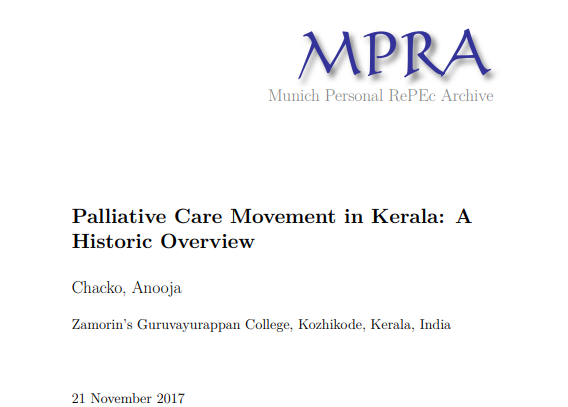Social Capital and Sustainable Health Care: An Analysis of Community Based Palliative Care Model of Kerala
One of the standout features of the palliative care movement in Malappuram is the active involvement of the local community. The study reveals that the success of the palliative care model in this district is significantly influenced by the cohesion and cooperation among the population, particularly the Muslim community, which has played an essential role in supporting and sustaining the movement during its formative years. This strong sense of community solidarity has translated into widespread participation in palliative care initiatives, fostering an environment of mutual aid and collective action.
A critical socio-economic factor contributing to the movement’s success in Malappuram is the financial support from the Middle East countries. Many residents of the district have migrated to the Gulf region for employment, and their remittances have provided a vital source of funding for palliative care initiatives. This financial backing has helped palliative care centers in Malappuram achieve economic sustainability, ensuring that services can be provided to patients and families without imposing a financial burden.
The study further highlights the unique characteristics of palliative care centers in Malappuram, such as the widespread implementation of home-based care, economic sustainability, and the high level of voluntarism. Volunteers from diverse sections of society, including students, youth, and professionals, actively participate in palliative care delivery, offering their time and skills to support patients and their families. The multidisciplinary team approach, which includes trained volunteers, doctors, nurses, and social workers, ensures that the care provided is both holistic and de-institutionalized, addressing the physical, psychological, social, and spiritual needs of patients.
The research also underscores the role of social capital in sustaining the palliative care movement in Malappuram. The district’s strong network of social relationships and trust has enabled effective mobilization of resources, both human and financial. Community members’ active participation and commitment have transformed palliative care into a sustainable health care model that continues to benefit the most vulnerable populations, including the elderly, bedridden, and chronically ill.
In conclusion, the findings from Malappuram illustrate how community-driven health care initiatives, supported by social capital, financial contributions, and voluntarism, can create a sustainable and effective palliative care model. The district’s success serves as a compelling example of how local resources and community engagement can be leveraged to address pressing health care challenges, providing valuable insights for similar initiatives in other regions.




Comments
Post a Comment